

Japan’s Most Dangerous Game: Rock, Paper, Scissors. If you’ve ever needed help making a small decision like who gets the last piece of pizza or who gets to ride shotgun, you’re probably more than familiar with the game of rock, paper, scissors.
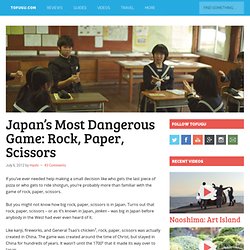
But you might not know how big rock, paper, scissors is in Japan. Turns out that rock, paper, scissors – or as it’s known in Japan, janken – was big in Japan before anybody in the West had ever even heard of it. Like kanji, fireworks, and General Tsao’s chicken†, rock, paper, scissors was actually created in China.
The game was created around the time of Christ, but stayed in China for hundreds of years. It wasn’t until the 1700s that it made its way over to Japan. The rest, as they say, is history. How to Play Janken is played pretty similarly to the way most people play rock, paper, scissors in the US: you use one of three moves to beat your opponent. Obviously in Japan though, they use different terminology. The differences don’t stop there. But it doesn’t stop there. How does it do it?
Gambling in Japan. Gambling in Japan is generally banned by the Criminal Code chapter 23,[1] however there are several exceptions, including betting on horse racing and certain motor sports.[2] Public sports, lottery, and toto (football pools) are held under special laws in order to increase the income of national and local governments, as well as to offer a form of entertainment for many people.
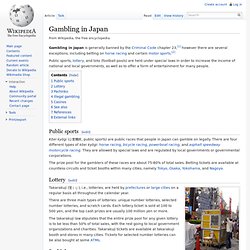
Public sports[edit] Kōei kyōgi (公営競技, public sports) are public races that people in Japan can gamble on legally. There are four different types of kōei kyōgi: horse racing, bicycle racing, powerboat racing, and asphalt speedway motorcycle racing. They are allowed by special laws and are regulated by local governments or governmental corporations. The prize pool for the gamblers of these races are about 75-80% of total sales. Lottery[edit] Small street shop, in Ikebukuro, selling takarakuji tickets. Tokyo-Ga - Pachinko & Mu. WSOP Champ Naoya Kihara Leading Japan's Poker Boom.
Naoya Kihara is the man when it comes to poker in Japan.

In 2012 Naoya Kihara became the first Japanese player to win a World Series of Poker bracelet, just one of the reasons Japan is on the verge of a poker boom. Since winning his bracelet Kihara has been signed to a sponsorship deal with Pokerstars and become the premier poker player in his home country. Live casino gambling, including poker, is illegal in Japan but according to Kihara that might soon change. “The government knows they can make a lot of money from casinos, and if they legalize it poker is going to get very big in Japan,” Kihara told PokerListings.com at the 2013 PCA. Kihara is on the front line of the Japanese poker world, a role that was thrust upon him thanks to his success in Las Vegas.
Along with the more than half a million dollars he won at the WSOP, Kihara has also garnered widespread media attention in his home country. Kihara is the first and only Japanese WSOP bracelet winner. Tobaku Mokushiroku Kaiji de Nobuyuki Fukumoto. Cette « Apocalypse du Pari » a très justement fait la réputation de Nobuyuki Fukumoto : dans cette série qui met en scène Itō Kaiji, l’auteur passe au crible la culture des jeux de hasard (très éloignés des jeux de poker en ligne ou de roulette) si importants aux yeux du peuple Nippon.

La série des Kaiji est d’autant plus forte qu’elle se situe dans un contexte historique bien réel. En 1995, le Japon est plongé dans une récession économique sans précédent. Les consommateurs voient leur pouvoir d’achat diminuer comme une peau de chagrin et beaucoup connaissent des difficultés colossales pour subsister. Kaiji Itō n’échappe pas à cette dure réalité : sorti depuis peu de l’enseignement secondaire, il débarque à Tokyo dans l’espoir de trouver un emploi. TOBAKU MOKUSHIROKU KAIJI 62 - Read TOBAKU MOKUSHIROKU KAIJI Chapter 62 Online - Page 17. 1450 - Tobaku Mokushiroku Kaiji (Nintendo DS) - Game title: Sakai Burai Kaiji - Death or Survival - Support: Nintendo DS - Country: Japan - Year: 2008 - Publisher: Compile Heart - Genre: Adventure Introduction screenshot:
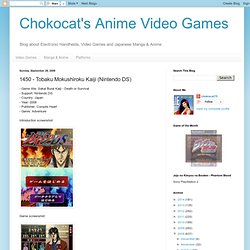
The Battle for the Global Entertainment Industry: Japan's Growing Strength in Digital Culture, UCLA Asia Institute. Japan is quietly developing a powerhouse of related technologies in the entertainment industry that will give the Americans a run for their money.
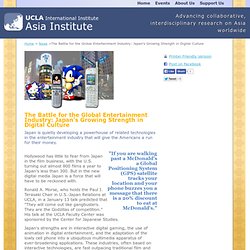
"If you are walking past a McDonald's a Global Positioning System (GPS) satellite tracks your location and your phone buzzes you a message that there is a 20% discount to eat at McDonald's. " Hollywood has little to fear from Japan in the film business, with the U.S. turning out almost 800 films a year to Japan's less than 300. But in the new digital media Japan is a force that will have to be reckoned with. Ronald A. Morse, who holds the Paul I. Japan's strengths are in interactive digital gaming, the use of animation in digital entertainment, and the adaptation of the lowly cell phone into a ubiquitous multimedia apparatus of ever-broadening applications.
"When I am in Tokyo I am in the Japanese digital culture," Morse said. Part of assessing Japan's potential in the digital industry is its better access to consumers in Asia. Ronald A.
Pachinko: le jeu japonais par excellence. How to play Pachi-Slot. Un premier casino au Japon. Il y a encore peu de temps, la question de la légalisation des Casinos au Japon était encore tabou.
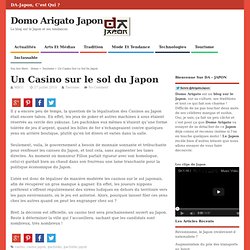
En effet, les jeux de poker et autres machines à sous étaient réservés au cercle des yakuzas. Les pachinkos eux mêmes n’étaient qu’une forme tolérée de jeu d’argent, quand les billes de fer s’échangeaient contre quelques yens en arrière boutique, plutôt qu’en lot divers et variés dans la salle. Seulement, voila, le gouvernement a besoin de monnaie sonnante et trébuchante pour renflouer les caisses du Japon, et tout cela, sans augmenter les taxes directes. Au moment où monsieur Fillon parlait rigueur avec son homologue, celui-ci gardait bien au chaud dans son fourreau une lame tranchante pour la politique économique du Japon. L’idée est donc de légaliser de manière modérée les casinos sur le sol japonais, afin de récupérer un gros manque à gagner.